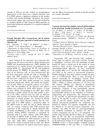 September 2023 in “The Journal of Steroid Biochemistry and Molecular Biology”
September 2023 in “The Journal of Steroid Biochemistry and Molecular Biology” Stopping finasteride for male pattern hair loss changes neuroactive steroid levels in the brain and blood.
 September 2023 in “Journal of The American Academy of Dermatology”
September 2023 in “Journal of The American Academy of Dermatology” Patients with skin cancer on the scalp and ear in Mexico have specific features and results from their treatments.
 July 2023 in “JAAD International”
July 2023 in “JAAD International” Two drugs, finasteride and minoxidil, are approved for hair loss treatment, but new therapies are being developed.
 November 2022 in “Revista Hospital Clínico Universidad de Chile”
November 2022 in “Revista Hospital Clínico Universidad de Chile” COVID-19 may cause hair loss due to the virus's effects and stress from the pandemic.
 December 2021 in “Molecular genetics and genomics”
December 2021 in “Molecular genetics and genomics” Cats with abnormal hair had DSG4 gene changes causing hair problems.
January 2021 in “Journal of clinical & experimental dermatology research” The new 5% minoxidil formulation without propylene glycol effectively promotes hair growth with fewer side effects and better user satisfaction.
September 2019 in “The journal of investigative dermatology/Journal of investigative dermatology” Mononuclear cells may protect against certain chemotherapy-induced hair loss.
 April 2019 in “Dermatology reports”
April 2019 in “Dermatology reports” A 12-year-old boy's hair fully regrew after 8 weeks of treatment for tinea capitis, and dermoscopy was useful for diagnosis and monitoring.
 May 2017 in “bioRxiv (Cold Spring Harbor Laboratory)”
May 2017 in “bioRxiv (Cold Spring Harbor Laboratory)” The peach gene pCTG134 helps control the interaction between auxin and ethylene hormones during fruit ripening.
 January 2017 in “Diabetes case reports”
January 2017 in “Diabetes case reports” OMICS International aims to freely share scientific research for everyone's access.
 May 2016 in “Endocrine Abstracts”
May 2016 in “Endocrine Abstracts” The removal of the adrenal tumor improved the patient's symptoms and reduced androgen levels, indicating successful surgery.

The document concludes that accurate diagnosis and management of PCOS are crucial due to its associated health risks.
 May 2006 in “Frontiers in Neuroendocrinology”
May 2006 in “Frontiers in Neuroendocrinology” Progesterone and its metabolites affect myelin protein expression differently in male and female rat Schwann cells.
December 2005 in “Dermatologic surgery” Er:YAG laser therapy is ineffective for treating facial eruptive vellus hair cysts due to early recurrence and side effects.
April 2023 in “Zenodo (CERN European Organization for Nuclear Research)” February 2023 in “Current Pharmaceutical Design” Natural remedies like certain plants can help reduce hair loss and promote hair growth.
October 2022 in “Biomolecules” Allopregnanolone can reduce gut inflammation and normalize neurotransmitter levels after finasteride withdrawal.
May 2022 in “Endocrine Abstracts” Finasteride may cause sexual dysfunction by reducing epinephrine levels.
February 2021 in “International journal of regenerative medicine” A new method using fat tissue cells may help treat hair loss.
January 2021 in “Medical research archives” The 5% minoxidil lotion without propylene glycol is effective, well-tolerated, and cosmetically acceptable for hair loss.
 November 2020 in “DOAJ (DOAJ: Directory of Open Access Journals)”
November 2020 in “DOAJ (DOAJ: Directory of Open Access Journals)” Inflammation plays a key role in male and female pattern hair loss, and focusing on this could help develop better treatments.
 April 2018 in “Journal of Investigative Dermatology”
April 2018 in “Journal of Investigative Dermatology” Platelet Rich Plasma can potentially help in restoring hair loss, but more research with larger groups is needed to confirm its effectiveness and standardize its use.
November 2005 in “Hair transplant forum international” Genetic differences in hair loss can help improve diagnosis and treatment.
 62 citations,
April 2008 in “Neurobiology of aging”
62 citations,
April 2008 in “Neurobiology of aging” Scientists found a gene in mice that causes early hearing loss.
 8 citations,
December 2020 in “The FASEB Journal”
8 citations,
December 2020 in “The FASEB Journal” Blocking adenosine A2B receptor may prevent or treat hearing loss.
 4 citations,
August 2021 in “The Malaysian journal of medical sciences/The Malaysian Journal of Medical Science”
4 citations,
August 2021 in “The Malaysian journal of medical sciences/The Malaysian Journal of Medical Science” Eating fewer calories improves the ability of stem cells to repair and renew the body in various tissues.
 2 citations,
March 2016 in “Journal of Mind and Medical Sciences”
2 citations,
March 2016 in “Journal of Mind and Medical Sciences” Finasteride, used for treating hair loss, can cause mental, physical, and sexual side effects, some of which may persist even after stopping the drug, and it can also cause mild to moderate oral issues.
 April 2024 in “Journal of pharmacy & pharmacognosy research”
April 2024 in “Journal of pharmacy & pharmacognosy research” A compound from Calophyllum inophyllum L. leaf may help treat non-small cell lung cancer.
August 2022 in “International Journal of Health Sciences (IJHS)” The combined treatment significantly improved hair growth and thickness compared to the control group.

















